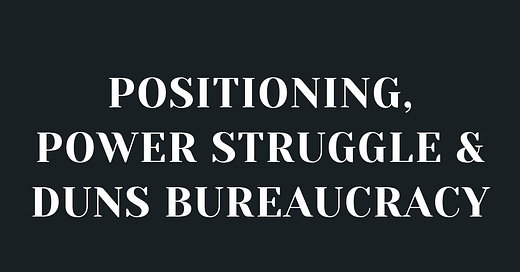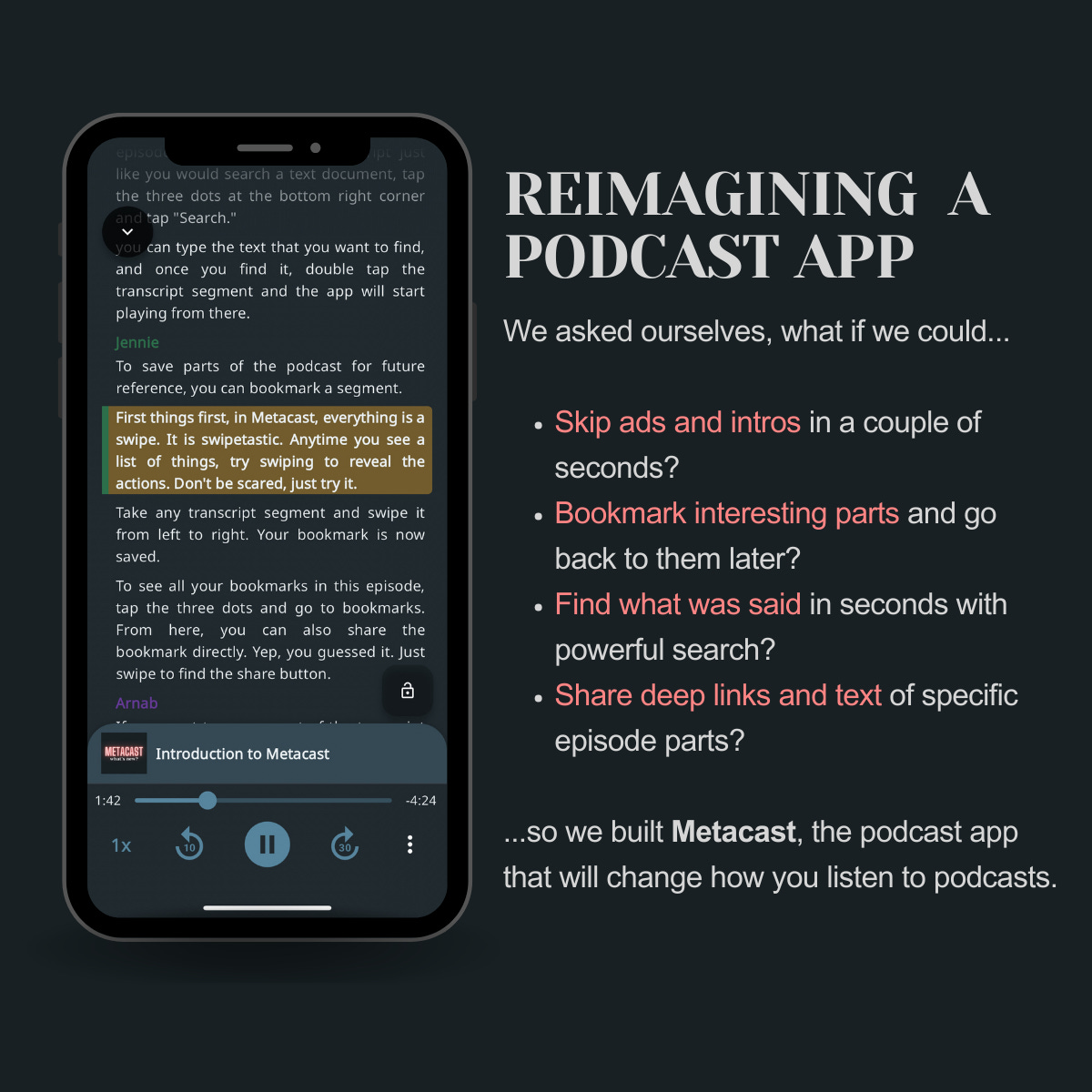In this issue
We’ve talked to a power user who made us think about positioning Metacast is not just for learners, but also for people who seek simplicity.
Our first power struggle.
A primer on the D-U-N-S number that Apple and Google require companies to obtain to be in app stores.
🎙️ You can also listen to the expanded discussion of these topics on our podcast on Metacast, Apple Podcasts, Spotify or watch on YouTube.
The positioning dilemma
We saw something interesting in metrics — there was one user who had more sessions and listened to more episodes in the Metacast podcast app than either me or Arnab. Considering that we’re the heaviest users and use the app for testing a lot, this was unexpected.
So, we reached out to the user to ask them a few questions.
It turned out, they were a Google Podcasts user before Google killed it and were looking for a simple replacement. Their partner saw my post on LinkedIn, tried Metacast, and recommended it. It was nice to learn we had this unexpected organic reach, but more importantly we learned a ton about this user’s usage patterns.
For this user, the superpower of Metacast was its simplicity.
I’ll quote:
You're not trying to cram a lot of garbage down my throat.
We agree with them. We built Metacast such that you’re always in control of what you’re consuming. It’s a tool, rather than a recommendation platform with a feed.
Since we want to capture Google Podcasts users, we need to figure out how to position Metacast to appeal to both people who want to extract knowledge from podcasts and people who just want a simple podcast player. These goals are not mutually exclusive; in fact, our functionality already achieves them. But marketing is a different story. It gets confusing very quickly.
If you have any ideas that could help us with positioning, please reach out to us at feedback@metacast.app.
Our first “power struggle”
Talking to the power user made us prioritize a feature we’ve been thinking about for a while. We added a tabbed view to the player to make it easy to switch between the transcript, show notes and bookmarks.
I spent a lot of time figuring it out the look and feel for this feature, and eventually settled on a 5% transparency.
Arnab didn’t like it and we had a prolonged argument, which eventually had to be settled with the help of an experienced third party designer-friend. He didn’t notice the transparency at all, but liked it after we pointed it out. So, we kept it.
But this argument raised a meta-point for me. How do we settle these in the future?
The problem with the argument was that it was a matter of taste. I liked transparency. Arnab didn’t. Both of us felt strongly about it (though I probably felt a lot stronger). The Slack thread was 111 messages…
I’d like to quote David Ogilvy, a legendary advertising entrepreneur:
Search the parks in all your cities. You'll find no statues of committees.
In a big company, we’d have settled for something that pleased both of us. But in this case, it felt like if we follow the same approach, the app will end up in a graveyard, killed by a thousand compromises. So I stood my ground, even though it was uncomfortable.
This made me think of 37signals where they have an operating agreement that dictates that Jason Fried has the final word over UX and DHH has the final word over technical stuff. I think it was on this episode of REWORK.
I don’t think we’re there yet, because so far we’ve been able to reach a resolution via negotiation. In the future, if we ever feel like negotiations make us ineffective, we might look for something like 37signals’ approach.
N.B. The “power struggle” wording is obviously click-bait. This argument was mostly fun and I’m happy to have Arnab as a co-founder!
D-U-N-S Number
To publish an app in the Apple App Store or Google Play Store, companies are required to obtain a D-U-N-S number from an entity called Dun & Bradstreet (individuals don’t need it).
We got our DUNS when we were first setting up our developer account almost a year ago. It was fairly straightforward except that… they misspelled my name as LLYA (seems to be common in Spanish-speaking regions, because there are lots of Spanish words that start with a double L).
Oh, well. This was an omen of the things to come.
Misspelling a name that was typed into a form can only mean one thing. Someone looked at it and re-typed it somewhere else manually. This could only be a human mistake. We had to open a support case to correct the spelling and it seemed to have been resolved.
As we’re getting ready for launch, Apple sent us cryptic email saying that we need to confirm if we’re a trader (I can’t help vocalizing it as “traitor”). After doing some research, we found out that if we charge users in the EU, we’re a trader. If we’re a trader, Apple will publish our business address and phone number on the App Store.
Ouch.
To avoid disclosing our personal addresses, we signed up for a business address and tried to update Apple App Store Connect. This required an update to our address in DUNS, which turned out to be quite an adventure. I wasted a few hours over the course of a few weeks dealing with D&B.
I’ll spare you the details; you can listen to the entire convo on the podcast. I’ll just say that it took multiple days, two support chats, a support case, and a special non-public (or at least not easily discoverable) link.
And the icing on the cake? We discovered that my name was still spelled as LLYA, so I had to request to correct it again.
Our advice to mobile app entrepreneurs — get started on DUNS early and get a business address and business phone before signing up for it.
What else is happening with Metacast?
New features! We’ve shipped some cool playlist features and a UX upgrade in v0.69 and v0.70.
UX upgrade! We’re working on an overhaul of UX for Transcript and Bookmarks tabs in the player. This is coming in v0.71 next week-ish. The app now looks a lot more polished!
Web app update! Metacast.app now has links to Apple Podcasts, Spotify and YouTube for episodes that you share from Metacast. If you use Metacast, you can share links with other people even if they don’t use Metacast.
Getting ready to launch! We’re implementing a paid subscription functionality, onboarding flow, and a few finishing touches here and there. We hope to launch in Google Play Store in the coming weeks!
Ad break — have you installed Metacast yet?
Metacast is in open beta and is free to use until we implement the monetization features. Please give it a try and send us feedback. Your support and help means a ton to us! Download Metacast for iOS and Android here.
Bonus content
Check out the new episodes on the Builders Gonna Build podcast:
Ep.8: John Crickett on growing your LinkedIn and newsletter audience















Share this post